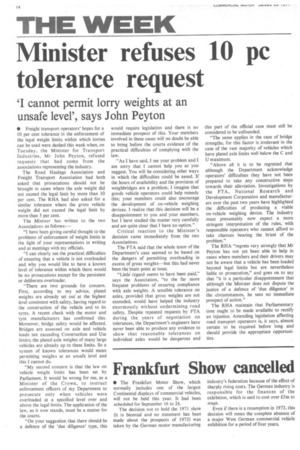Minister refuses 10 pc tolerance request
Page 16

If you've noticed an error in this article please click here to report it so we can fix it.
'I cannot permit lorry weights at an unsafe level', says John Peyton
• Freight transport operators' hopes for a 10 per cent tolerance in the enforcement of the legal weight limits within which lorries can be used were dashed this week when, on Tuesday, the Minister for Transport Industries, Mr John Peyton, refused requests that had come from the associations representing the industry.
The Road Haulage Association and Freight Transport Association had both asked that prosecutions should not be brought in cases where the axle weight did not exceed the legal limit by more than 10 per cent. The RHA had also asked for a similar tolerance where the gross vehicle weight did not exceed the legal limit by more than 5 per cent.
The Minister has written to the two Associations as follows—
"I have been giving careful thought to the problems of enforcement of weight limits in the light of your representations in writing and at meetings with my officials.
"I can clearly see the practical difficulties of ensuring that a vehicle is not overloaded and why you would like to have a known level of tolerance within which there would be no prosecutions except for the persistent or deliberate overloader.
"There are two grounds for concern. First, according to my advice, plated weights are already set out at the highest level consistent with safety, having regard to the construction of the vehicle and to its tyres. A recent check with the motor and tyre manufacturers has confirmed this. Moreover, bridge safety would be affected. Bridges are assessed on axle and vehicle loads not exceeding Construction and Use limits; the plated axle weights of many large vehicles are already up to these limits. So a system of known tolerances would mean permitting weights at an unsafe level and this I cannot do.
"My second concern is that the law on vehicle weight limits has been set by Parliament. It would be wrong for me, as a Minister of the Crown, to instruct enforcement officers of my Department to prosecute only when vehicles were overloaded at a specified level over and above the legal limits. The application of the law, as it now stands, must be a matter for the courts.
"On your suggestion that there should be a defence of the 'due diligence' type, this would require legislation and there is no immediate prospect of this. Your members involved in these cases will no doubt be able to bring before the courts evidence of the practical difficulties of complying with the law.
"As I have said, I see your problem and I am sorry that I cannot help you as you suggest. You will be considering other ways in which the difficulties could be eased. If the hours of availability and the provision of weighbridges are a problem, I imagine that goods vehicle operators could help remedy this; your members could also encourage the development of on-vehicle weighing devices. I realize that this decision will be a disappointment to you and your members, but I have studied the matter very carefully and am quite clear that I have no option."
Critical reaction to the Minister's decision came immediately from the two Associations.
The FTA said that the whole tenor of the Department's case seemed to be based on the dangers of permitting overloading in excess of gross weights—but this had never been the 'main point at issue.
"Little regard seems to have been paid," says the Association, "to the far more frequent problems of ensuring compliance with axle weights. A sensible tolerance on axles, provided that gross weights are not exceeded, would have helped the industry enormously without undermining road safety. Despite repeated requests by FTA during the years of negotiation on tolerances, the Department's engineers have never been able to produce any evidence to show that reasonable tolerances on individual axles would be dangerous and this part of the official case must still be considered to be unfounded.
"The same applies in the case of bridge strengths, for this factor is irrelevant in the case of the vast majority of vehicles which have plated axle limits well below the C and U maximum.
"Above all it is to be regretted that although the Department acknowledge operators' difficulties they have not been prepared to take any constructive steps towards their alleviation. Investigations by the FTA, National Research and Development Corporation and manufacturers over the past two years have highlighted the difficulties of producing a viable on-vehicle weighing device. The industry must presumably now expect a more stringent interpretation of the rules, with responsible operators who cannot afford to take chances bearing the brunt of the problem."
The RHA "regrets very strongly that Mr Peyton has not yet been able to help in cases where members and their drivers may not be aware that a vehicle has been loaded beyond legal limits but are nevertheless liable to prosecution," and goes on to say that "it is a particular disappointment that although the Minister does not dispute the justice of a defence of 'due diligence' in the circumstances, he sees no immediate prospect of action."
The RHA maintain that Parliamentary time ought to be made available to rectify an injustice. Amending legislation affecting road transport operators is, it says, almost certain to be required before long and should provide the appropriate opportunities.




























































































